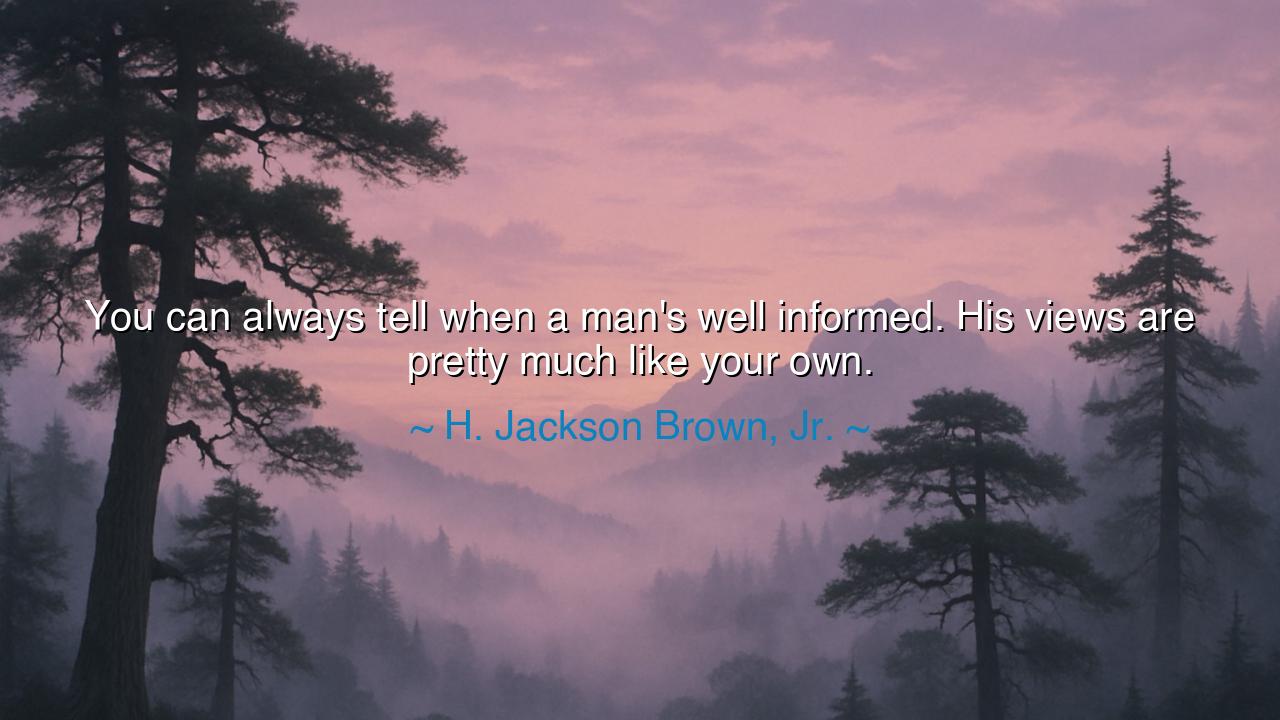
You can always tell when a man's well informed. His views are
You can always tell when a man's well informed. His views are pretty much like your own.






When H. Jackson Brown, Jr. remarked, “You can always tell when a man’s well informed. His views are pretty much like your own,” he offered a pointed reflection on the nature of knowledge and the subjectivity of human understanding. Brown’s words, laced with humor and insight, challenge us to reflect not only on how we gain knowledge, but also on how we shape it into our views and opinions. The implication is clear: while we may pride ourselves on being informed, we often find that the more educated we become, the more we tend to align our views with those who share our experiences, values, and assumptions. This echoing of views is not necessarily a flaw, but a reminder that wisdom can sometimes be a mirror reflecting our own biases and beliefs.
In ancient wisdom, there were many who cautioned against the dangers of seeing the world only through the lens of one’s own experiences. Socrates, the great philosopher, famously said, “The only true wisdom is in knowing you know nothing.” His humility was not a lack of knowledge, but a recognition that knowledge must be tempered with the awareness of its limitations. Socrates understood that true learning happens not when we confirm what we already believe, but when we question our beliefs and are open to new ways of seeing the world. Brown’s words echo this, for when we surround ourselves only with information that confirms our biases, we stop growing, and our knowledge becomes narrow.
The meaning of Brown’s statement lies in this: being well-informed does not necessarily mean we possess truth. It means we have collected data, ideas, and opinions — often from sources that align with our pre-existing beliefs. True knowledge requires not just information, but the ability to see beyond ourselves, to embrace ideas that challenge our perspectives and make us uncomfortable. In this sense, being well-informed can be a double-edged sword. While it may give us a sense of confidence, it can also blind us to the broader complexity of truth. In fact, the more informed we are, the more we may reinforce our own worldviews, seeing only the patterns that confirm what we already think, rather than challenging them.
A real-life example of this can be found in the history of Galileo Galilei, who, in the 16th century, dared to propose that the Earth revolved around the Sun. At the time, this contradicted the prevailing view held by the church and the majority of the educated world. Galileo was, in a sense, more informed than those around him — he had the knowledge, the evidence, and the courage to challenge the status quo. Yet, despite his vast learning, he was met with vehement opposition because his ideas challenged the deeply held beliefs of the time. His story is a powerful reminder that knowledge alone is not enough; courage and the willingness to question and challenge even the most well-established ideas are essential for true progress.
The lesson in Brown’s quote is a profound one: knowledge must be sought with both open-mindedness and humility. It is not enough to simply seek information that confirms our existing views; we must strive for a deeper understanding that challenges us, that helps us see the world through different eyes. Being well-informed is a process of continually questioning and reevaluating our beliefs, not simply absorbing information that reinforces our comfort zone. Only then can we move beyond the narrow scope of our own understanding and embrace the full richness of truth.
Practical actions we can take from this wisdom include:
-
Seek diversity in knowledge: Don’t limit your sources of information to those that align with your current beliefs. Seek out perspectives that challenge you, that make you think and question.
-
Cultivate humility: Acknowledge that the more we know, the more we realize there is yet to understand. Be open to learning from those whose experiences differ from yours.
-
Engage in dialogue: Surround yourself with people who have differing opinions. Not to argue, but to learn and understand why they think the way they do.
-
Be self-reflective: Regularly assess your own biases and assumptions. Ask yourself why you believe what you believe and whether you are allowing confirmation bias to limit your understanding.
For as H. Jackson Brown, Jr. reminds us, being well-informed does not guarantee that we possess truth; it may simply mean we have aligned our views with those who think like we do. To seek true wisdom, we must embrace knowledge with humility, curiosity, and a willingness to be challenged. In this, we find not just information, but growth, and in growth, we find the path to greater understanding and a more complete truth.






AAdministratorAdministrator
Welcome, honored guests. Please leave a comment, we will respond soon